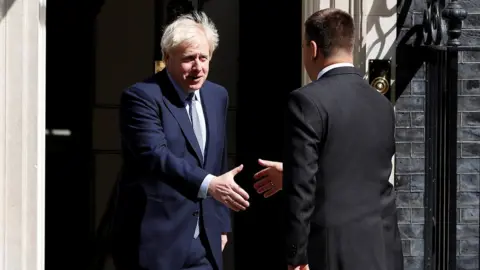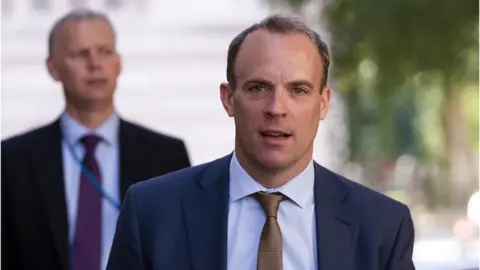Brexit: No 10 rejects EU's view of talks
 Reuters
ReutersThe government has rejected claims it is unwilling to negotiate with the EU and wants talks to fail to allow a no-deal Brexit.
It comes after the EU said UK demands to remove the Irish backstop from Theresa May's deal were unacceptable.
EU negotiators told European diplomats there was currently no basis for "meaningful discussions" and talks were back where they were three years ago.
Downing Street said the EU needed to "change its stance".
The European Commission said on Tuesday morning it was willing to hold talks in the coming weeks by phone or in person, "should the UK wish to clarify its position in more detail".
A spokeswoman added the agreement negotiated by Mrs May - rejected three times by MPs - was the "best possible deal", and could not be re-opened.
Many opponents of Mrs May's deal cite concerns over the backstop - an insurance policy to prevent a hard border returning on the island of Ireland - which if implemented, would see Northern Ireland staying aligned to some rules of the EU single market.
It would also involve a temporary single customs territory, effectively keeping the whole of the UK in the EU customs union. These arrangements would apply unless and until both the EU and UK agreed they were no longer necessary.
A No 10 spokesperson said: "The prime minister wants to meet EU leaders and negotiate a new deal - one that abolishes the anti-democratic backstop.
"We will throw ourselves into the negotiations with the greatest energy and the spirit of friendship and we hope the EU will rethink its current refusal to make any changes to the withdrawal agreement."
New Prime Minister Boris Johnson has pledged to leave the EU by the deadline of 31 October, with or without a deal.
BBC Brussels reporter Adam Fleming said the meeting on Sunday between officials and diplomats was a debrief from discussions last week between the EU, UK Brexit Secretary Steve Barclay and Mr Johnson's European envoy, David Frost.
A senior EU diplomat told the meeting a no-deal Brexit appeared to be the UK government's "central scenario", according to the Daily Telegraph and the Guardian.
"It was clear UK does not have another plan. No intention to negotiate, which would require a plan," the diplomat is reported to have said.
Mr Frost reiterated the prime minister's stance that the backstop element of Mrs May's plan must be abolished, and stressed that Mr Johnson's new ministers were not bound by commitments made by the previous government.
He also raised concerns about the UK's "divorce bill" and the proposed role of the European Court of Justice, the EU's top court, after Brexit.
'Continued dialogue'
Further talks between the two sides have not been ruled out, and Adam Fleming said the G7 summit in France at the end of August could be the moment of truth - the point at which a no-deal Brexit becomes inevitable.
Meanwhile, Mr Johnson is meeting his first foreign leader since entering Downing Street - Estonian Prime Minister Juri Ratas.
The country's Foreign Minister, Urmas Reinsalu, said earlier that while the "reality" was the withdrawal agreement - including the backstop - had been jointly agreed by EU member states, there was still a need for continued dialogue in the coming weeks to avoid a no-deal Brexit.
He told BBC Radio 4's Today programme alternatives to the backstop could be discussed after the ratification of the withdrawal deal.

No reason to get back round the table

The EU is not optimistic about any agreement with the UK.
The message they are getting from Boris Johnson's team is that the UK is not going to sign another deal unless it involves getting rid of the backstop.
But the EU has been clear time and time again that it isn't going to do that - the backstop is an integral part of any withdrawal agreement and it has to stay.
So the conclusion of officials is there is no reason to get back round the table at the moment, for the simple reason that they don't think they can meet the conditions Boris Johnson has set.
There are a couple of months to try to eke something out from one of the sides - to see if somebody blinks and there is some room for negotiation either in Brussels or in London.
But at the moment, many people think the direction of travel is heading towards a no-deal Brexit.

The meeting follows an interview with Health Secretary Matt Hancock, who said he believed Parliament could no longer block the UK from leaving the EU without a deal.
In a no-deal scenario, the UK would immediately leave the EU with no agreement about the "divorce" process, and would exit overnight from the single market and customs union.
Opponents say a no-deal exit would damage the economy and lead to border posts between Northern Ireland and the Republic. Other politicians argue any disruption could be quickly overcome.
Prominent pro-EU Conservative Dominic Grieve has insisted there are still a number of options available to MPs to block a no deal - including bringing down the government with a vote of no confidence.
He told BBC Radio 5Live the idea that Mr Johnson might refuse to resign even if he lost such a vote and another PM secured the confidence of the Commons was "breathtaking, stupid, infantile, and it won't work".
"Quite frankly, I'm astonished to hear these suggestions coming out," he added.
 EPA
EPAMeanwhile, Foreign Secretary Dominic Raab will begin a tour of North America on Tuesday as part of a bid to "fire up" the UK's trade relationships with countries outside the EU.
Mr Raab said the foreign ministers he saw at a meeting of the Association of Southeast Asian Nations in Thailand last week expressed a "consistent warmth" for the UK and a "desire to work more closely with us".
However, the former US treasury secretary, Larry Summers, said the UK was "delusional" if it believed it could secure a post-Brexit trade deal with Washington.
He told BBC Radio 4's Today programme: "Britain has no leverage, Britain is desperate... it needs an agreement very soon. When you have a desperate partner, that's when you strike the hardest bargain."
